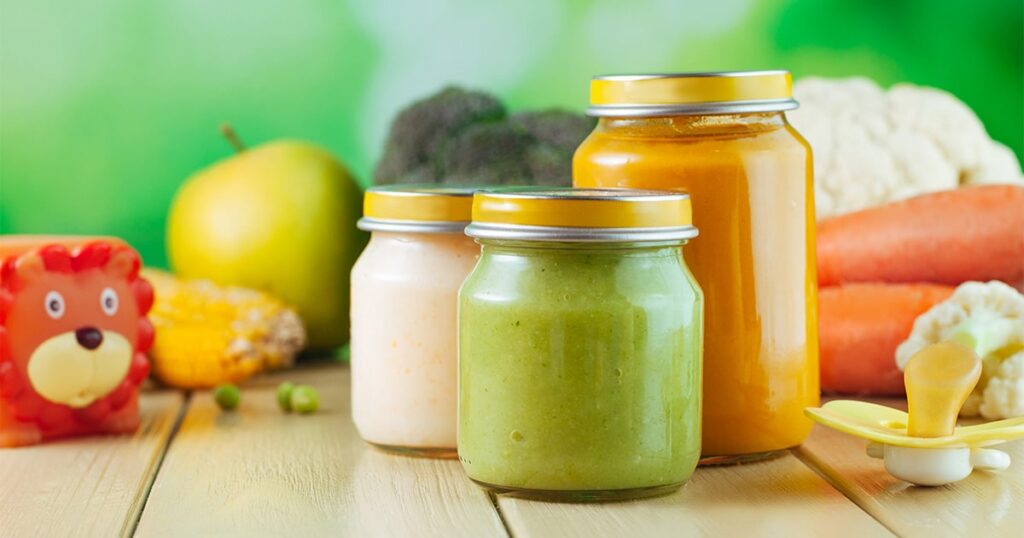The origin of autism spectrum disorder (ASD) has long been a mystery that has left many in the world of science and child development perplexed. ASD encompasses an array of social, communicative, and behavioral challenges resulting from genetic and environmental interactions. However, considerable progress has been made toward understanding its causes. Yet still its exact origins remain enigmatic, leading to numerous theories and conjectures about its source(s).
One provocative theory proposes that baby food, could affect autism’s onset or exacerbation. At the heart of this contentious debate is whether certain ingredients or contaminants found in commercially available baby food could lead to increased ASD symptoms and cause ASD itself. Such claims have spurred passionate discussions and led to further investigations of any possible relationship.
In this article, we conduct an in-depth investigation of the controversial connection between baby food and autism, carefully considering all available empirical data and expert opinions to determine its validity. Our goal is to give readers an in-depth knowledge of existing data so that they may navigate its complex nuances more effectively and make well-informed decisions for their children’s welfare.
Autism Spectrum Disorder: An Overview
ASD is a complex condition that impacts a persons neurological development and various aspects of social, communicative, and behavioral functioning. Formerly classified as a pervasive developmental disorder, ASD encompasses a number of issues and abilities which vary dramatically between people.
At its core, ASD can be defined by difficulties with social interactions and communication and repetitive patterns of behavior, interests, or activities that often manifest during early childhood and continue throughout an individual’s life.
ASD is frequently referred to as a spectrum disorder because of it’s vast array of symptoms and levels of impairment. Some of those affected may exhibit mild symptoms that have minimal impact on their daily living, while others may require significant assistance.
Over the past several decades, there has been an extraordinary rise in ASD cases. This trend has prompted researchers to explore the complex connections between genetic, environmental, and biological factors that influence its on set. Still, its exact causes and risk factors remain poorly understood and are still up for debate.
Want to learn more about autism? Check out this short youtube video.
Heavy Metals, Baby Food, and Autism
Heavy metal contamination of baby food has become an increasing source of concern for parents and healthcare professionals alike. Heavy metals such as lead, arsenic, and mercury have long been recognized to be toxic at high levels of exposure. These toxins could harm various bodily systems, including neurological development. Which is an crucial aspect of ASD. Thus it has become an important topic surrounding the possible links between baby food and autism spectrum disorder.
Multiple scientific studies have explored the connection between heavy metals and autism. Some have discovered a relationship between elevated levels of toxic heavy metals like lead and mercury exposure and an increase in autism risk. It should be noted, however, that while these correlations exist, they do not establish causation. More research must be conducted into how the genetic predispositions, environmental influences, and individual variability all play a part.
As much as heavy metals in baby food may cause alarm, parents must maintain an objective view when reviewing existing evidence. Any link between heavy metal exposure and autism remains an active research and debate area.
– Metal Profiles in Autism Spectrum Disorders
– Association of autism with toxic metals
– The Severity of Autism Is Associated with Toxic Metal Body Burden and Red Blood Cell Glutathione Levels
Preservatives, Food Coloring, Processed Foods, and Autism
Numerous studies have examined the connection between the preservatives and food coloring found in baby food and autism. Some scientific studies have established a correlation between the consumption and an increased risk of ASD. Additionally, some artificial food colorings and preservatives have been linked to having neurotoxic properties. Which may interfere with a childs neurological development and lead to the onset or worsening of autism spectrum disorder. While such studies establish a correlation, more research must determine if these ingredients do indeed contribute to the development of autism.
Many baby food products today contain preservatives, artificial colors, and other additives that have raised concerns regarding their impact on the health and development of the babies consuming them. The fact that a significant number of baby foods sold contain these potentially harmful ingredients has alarmed many and is prompting a call for greater scrutiny of the baby food industry.
Over recent decades, there has been an alarming spike in autism birth rates which some suspect is due to the increased consumption of processed food products and unhealthy baby foods. While pinpointing any one specific factor is impossible, it may be worthwhile exploring whether ASD prevalence might be tied to increased consumption of baby food and processed food containing these harmful ingredients.

The Gut-Brain Connection: Microbiome and Autism
Studies examining the relationship between autism and microbiomes are on the rise, with some reporting significant variations in gut microbiota composition and function among those living with ASD compared with those without. According to these research findings, altering microbiomes may affect autism’s onset by changing communication between the gut and brain, immune system functions, and metabolic processes. These studies have demonstrated that an imbalanced gut microbiome – with too few beneficial bacteria and too many potentially harmful microbes – can produce toxic byproducts that can harm brain function and behavior. This potentially leads to an imbalanced gut microbiota or dysbiosis, which may contribute to the onset of autistic behaviors.
Numerous ingredients found in baby foods have been identified as potentially disruptive to the microbiome and thus potentially contributing to the development of autism. Such ingredients include artificial preservatives, food additives, and other toxic substances. Most major brands of baby food products include these ingredients, which could result in alterations to the microbiome.
Although once again, the link between microbiome and autism remains poorly understood. These studies show that consuming baby food containing potentially harmful ingredients could result in disruptions in the microbiome that may increase the risk of autism.

List of Ingredients Commonly Found in Baby Food that Comprise the Microbiome
High-Fructose Corn Syrup: A sweetener made from corn often added to baby food to improve flavor. Corn syrup has been linked to obesity and an increased risk of metabolic disorders. It can also disrupt the gut microbiome by encouraging harmful bacteria growth while simultaneously decreasing beneficial bacteria populations.
Artificial Preservatives: Sodium benzoate and potassium sorbate may adversely impact our gut microbiomes by restricting beneficial bacteria from growing while encouraging potentially harmful ones to thrive. They are also known for triggering allergic reactions in some infants.
Artificial Food Colorings: Synthetic food dyes such as Red 40, Yellow 5, and Blue 1 are often used to boost visual appeal in baby foods. Studies have linked them to behavioral issues in children and hyperactivity. Not to mention these dyes can alter the gut microbiome by altering bacteria balance.
Carrageenan: A thickening agent made from seaweed, often added to baby food to improve it’s texture. Studies have revealed that it may cause inflammation and upset in the gut, potentially triggering digestive issues or leading to other health conditions.
Monosodium Glutamate: Also known as MSG, it is a flavor enhancer commonly found in processed foods, including baby food. While generally safe, MSG may cause adverse reactions in some infants, such as headaches, nausea, and irritability. MSG can also alter one’s gut microbiome by encouraging the growth of specific bacteria.
Partially Hydrogenated Oils: Partially hydrogenated oils are commonly used as a source of fat in baby food and have been linked with increased risks of heart disease and inflammation. Trans fats may also disrupt gut microbiomes by decreasing beneficial bacteria while encouraging harmful ones to thrive.
BPA (Bisphenol A): BPA is a chemical found in plastic food containers and may leach into baby food. They potentially disrupt the endocrine system and neurodevelopment. Studies have linked BPA exposure with disruptions of gut bacteria balance, altering its balance and potentially leading to adverse consequences in brain development.
Is Baby Formula Linked to Autism?
Numerous scientific studies have looked into the link between baby formula and autism, specifically ingredients commonly found in formula that are also linked with ASD. These ingredients include heavy metals, preservatives, and food coloring, which have raised concerns regarding their potential impact on their role in the onset of autism.
Heavy metals such as lead and arsenic have been identified as potential risk factors in the development of autism because of their harmful neurotoxic properties. Unfortunately, many major baby food brands, such as Similac, Enfamil, and Sprout Organic Foods, were found to contain dangerous levels of heavy metal contamination. Other problematic ingredients commonly found, such as preservatives and artificial food colorings, have also been linked with behavioral issues, hyperactivity, and the possible onset of autism among children.
Although these studies show a correlation between the consumption of baby formula containing these ingredients and an increased likelihood of autism spectrum disorder, more research must be conducted to establish whether specific components might increase these risks.
Studies have also indicated that breastfeeding may help lower the risk of autism. One study showed that infants breastfed for at least six months had lower odds of autism than non-breastfeed babies. This is possibly due to essential nutrients and bioactive components in breast milk that support optimal neurodevelopment and immune system functions.
Given our current evidence, parents should carefully evaluate the possible impacts of baby formula ingredients on infant health and development. While its link to autism remains debatable, parents should prioritize breastfeeding where possible and search out products free of potentially dangerous ingredients to limit any risks related to its consumption.

Current Lawsuits and Legal Battles: The Fight for Accountability in the Baby Food Industry
Recent years have witnessed an influx of high-profile lawsuits against major baby food manufacturers alleging they produced and sold products with potentially toxic substances that may contribute to Autism, including popular brands like Gerber, Beech-Nut, and Plum Organics. These suits seek financial compensation for affected families, arguing that manufacturers’ negligence and failure to adhere to safety standards caused neurological damage directly – something well-known brands like Gerber and Beech-Nut often deny doing.
As well as individual lawsuits against baby food companies, class action lawsuits have also been filed by many families who feel their children have been affected by contaminated baby food products. These class action suits seek financial compensation, changes to industry practices, and greater regulatory oversight to prevent future harm to these affected families.
One notable lawsuit filed in early 2021 alleges that several leading baby food manufacturers knowingly sold products containing dangerously high levels of heavy metals such as lead, arsenic, and cadmium. A congressional report revealed these manufacturers knew of heavy metal contamination issues but failed to address or inform the public. To respond to this suit, a federal judge has been assigned as overseer to oversee proceedings and decide the next course of action.
Legal battles continue, putting regulatory agencies and government bodies under increasing pressure to address baby food contamination and its potential link to autism. There have been calls for stricter regulations, improved testing protocols, and more transparency as lawmakers press for legislative intervention to safeguard infant and young child nutrition products and preserve health outcomes.
These legal battles will have lasting implications for the baby food industry and families affected by autism. While researchers continue to debate whether baby food causes autism, the legal pursuit of justice serves as a powerful catalyst for change, driving it towards prioritizing safety and well-being for its youngest consumers.
Learn more about the current on going legal battles aginst the baby food industry.
What Parents Should Do with This Information?
In light of the potential connection between baby food and autism, parents may find themselves wrestling with the challenge of deciding how to provide their children with the best possible nutrition. Though its exact cause remains unknown, scientific evidence underscores the importance of selecting healthy baby food made with clean ingredients.
Parents seeking to protect their children from exposure to contaminated baby food must remain aware of product recalls and avoid companies with lax ingredient safety policies. While organic baby foods may offer a better option, it’s still important to note their may still be some issues. Some large organic baby food companies such as Sprout Foods and Beech-Nut, have been found with trace amounts of heavy metals present. Even so, we highly recommend giving your children organic foods as they generally contain fewer harmful substances than their non-organic counterparts.
Homemade baby food offers parents another alternative, providing greater control over ingredients and nutritional content while assuring their children receive a diet tailored specifically to their specific needs and free from potentially harmful additives.
Breastfeeding should always be prioritize, given all of its health advantages and its association with reduced rates of autism. Parents should only resort to baby formula when breastfeeding is unavailable, as breast milk provides optimal nutrition and can help protect against potential health problems.
In conclusion, parents should stay informed when making choices regarding their children’s nutrition. By choosing clean, healthy baby food options, prioritizing organic products, and considering homemade alternatives, parents can take a proactive approach to safeguarding their children’s health and well-being.

